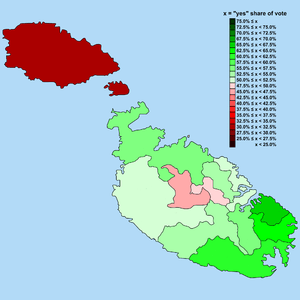Maltese divorce referendum, 2011
| Maltese divorce referendum | ||||||||||||||||||||||
|---|---|---|---|---|---|---|---|---|---|---|---|---|---|---|---|---|---|---|---|---|---|---|
| The legalization of divorce in Malta | ||||||||||||||||||||||
| ||||||||||||||||||||||
| ||||||||||||||||||||||
| Note: Saturation of colour denotes strength of vote | ||||||||||||||||||||||
 |
| This article is part of a series on the politics and government of Malta |
|
Republic |
|
|
| Foreign relations |
A referendum on divorce was held in Malta on 28 May 2011. Voters were asked whether they approved of a new law to introduce allow divorces, as at that time, Malta was one of only three countries in the world (along with the Philippines and the Vatican City)[1] in which divorce was not permitted.[2] The proposal was approved by 53% of voters, resulting in a law allowing divorce under certain conditions being enacted later in the year.
Background
A private member's bill was tabled in the House of Representatives by Jeffrey Pullicino Orlando, a Nationalist Member of Parliament.[3] The text of the bill, which had been changed twice, did not provide for the holding of a referendum. This was eventually provided for through a separate Parliamentary resolution under the Referenda Act authorising a facultative, non-binding referendum to be held.
The Catholic Church in Malta encouraged a "no" vote through a pastoral letter issued on the Sunday before the referendum day.[4] Complaints were made that religious pressure was being brought to bear upon voters.[5] Around 8 per cent of marriages in Malta are already annulled by the Catholic Church.[5]
Question
Ballot papers had both English and Maltese questions printed on them. The English version of the question put to voters was as follows:
Do you agree with the introduction of the option of divorce in the case of a married couple who has been separated or has been living apart for at least four (4) years, and where there is no reasonable hope for reconciliation between the spouses, whilst adequate maintenance is guaranteed and the children are protected?[6]
The question, which resembled the proposal approved by Irish voters in the Irish divorce referendum of 1995, was somewhat controversial. It was claimed that it did not reflect the content of the private member's bill.[7]
Results
| Choice | Votes | % |
|---|---|---|
| For | 122,547 | 53.16 |
| Against | 107,971 | 46.84 |
| Invalid/blank votes | 2,173 | – |
| Total | 232,691 | 100 |
| Registered voters/turnout | 325,102 | 71.57 |
| Source: Department of Information | ||
Although for the referendum the whole country was considered as a single constituency, taking into account electoral districts, only three out of thirteen voted "no" to the referendum question.[1]
Aftermath
Discussion on the divorce bill started in earnest soon after the result was announced. In the second and third readings a number of MPs still voted against the bill. Parliament approved the law on 25 July. The law came into effect on 1 October.[8]
See also
References
- 1 2 "Malta to legalise divorce after bitter referendum". The Independent. 30 May 2011. Retrieved 30 May 2011.
- ↑ "Malta to hold divorce referendum in May (AFP)". 16 March 2011.
- ↑ Motion No. 206 – Private Members Bill – Civil Code (Amendt) Bill – (1st Reading) – Presented by Hon Jeffrey Pullicino Orlando MP and Hon Evarist Bartolo MP (the Eleventh Parliament)
- ↑ "Malta votes to introduce divorce laws". ABC (Australia). 31 May 2011. Retrieved 31 May 2011.
- 1 2 "Malta prepares to vote in historic referendum to allow divorce". The Guardian. 27 May 2011. Retrieved 30 May 2011.
- ↑ Writ by the President of Malta dated 28th March, 2011 Department of Information
- ↑ "Referendum question does not reflect divorce bill – Tonio Fenech". Malta Today. 16 March 2011. Archived from the original on 25 May 2011. Retrieved 30 May 2011.
- ↑ "MPs in Catholic Malta pass historic law on divorce". BBC News. 25 July 2011. Retrieved 16 July 2011.
